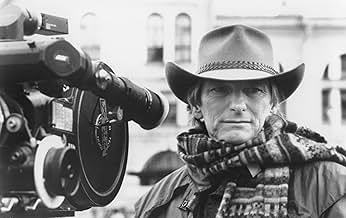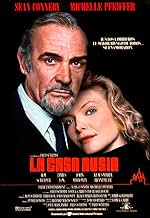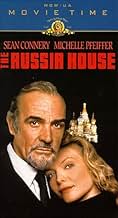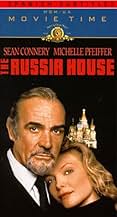A British publisher is sent a manuscript detailing Soviet Union nuclear missile capabilities. British Intelligence intercept it and recruit him to investigate the author's editor, a beautifu... Read allA British publisher is sent a manuscript detailing Soviet Union nuclear missile capabilities. British Intelligence intercept it and recruit him to investigate the author's editor, a beautiful Russian woman he claims never to have met.A British publisher is sent a manuscript detailing Soviet Union nuclear missile capabilities. British Intelligence intercept it and recruit him to investigate the author's editor, a beautiful Russian woman he claims never to have met.
- Awards
- 1 win & 5 nominations total
Ian McNeice
- Merrydew
- (as Ian McNiece)
Peter Marinker
- U.S. Scientist
- (as Peter Mariner)
- Director
- Writers
- All cast & crew
- Production, box office & more at IMDbPro
Featured reviews
I have read a few John Le Carre books (although not The Russia House) and was not as impressed as most other people seemed to be. People say that the movie is slow and cerebral (and it is) but really that is how Le Carre's books read. Sean Connery never puts in a bad performance, and neither does Michelle Pfeiffer. And it never hurts that she is sooooo beautiful. Klaus Maria Brandauer is also always good and still is here. The problem is the script, which relates back to the source material. It is a little bit of a bore. Not badly, just a bit. It looks like the filmmakers were so proud to be filming in the USSR, that they went a little overboard. Not every place in Russia is St. Basil's and the Winter Palace. Overall the film is OK.
My first comment for this site....exciting stuff.
Prompted to write this by seeing this again on video - the third time for me, and it's rare that I want to see anything three times. And I realized that it's fascination still holds....this is one of my top 10, definitely.
The reasons I would rate this a "9", while somebody else would give it a "5.9" are largely personal....i think it always comes down to the personal. Talk all we want, when we watch a movie - as when we eat a meal, or kiss someone - the pleasure center in the brain either lights up or doesn't. For me it's all about the love of a place...for Scott Barley Blair it's early Glastnost Russia, for me it's 90's Germany - Hamburg, Berlin...the strangeness, the trueness of people who surround you in such a place and your love for them because of this. The fact that a film can light up specific sense memories like these means that it is true - at least in that respect. This is a remarkably honest film - terrifically unsensational for a spy film and one of the rare "love stories" that delivers the satisfactions expected of a "love story" without getting mawkish. Everything rings true here except for the ending (a fabricated "happy ending" which is the only thing that kept me from rating this a 10).
To ask for Manchurian Candidate type excitement from this low key film is wrong. The suspense, which is remarkably sustained (those rich long tracking shots of people walking through public places to uncertain destinations to meet with, or maybe not meet with shadow characters who may be allies or enemies) is the truer suspense of the uncertainty of living in a gray, gray world...where nothing much happens, but peril is part of the fabric of mundane life.
(Those sequences are gorgeous....the colors of autumn in a Leningrad park, the closeups of the stone gargoyles....the moody circular stepping pace of the soundtrack....Branford Marsalis' saxophone.) Someone has said here that it is talky. Yes, it is talky...but the talk is brilliant...it is the perfect reflection of a world where everyone - book publishers and bureaucrats and spies alike speaks in mannered, ritualized streams of code. This is not disinformation - it is perfectly understood by all, a language that has supplanted the language of an earlier age in which sincerity was an option.
Besides that ending, the piece is perfectly faithful to LeCarre's novel. LeCarre's books have had good luck when being translated into movies. Of the eight or so that have been adapted, four have made great films: The Spy Who Came into the Cold, The Russia House, and the two George Smiley BBC miniseries. LeCarre is a great writer and more specifically great at plotting and dialogue, and these films all succeed pretty much by filming what is written unadorned and pouring on the atmosphere. And they are blessed with lead performances by three great actors at the top of the form - Richard Burton, Sean Connery and Alec Guiness (Guiness especially...to watch him for six hours in Smiley's People is one of the great pleasures).
A beautifully efficient and elegant translation by Tom Stoppard of a great novel, wonderfully dignified and touching performances by Connery and Michelle Pfeiffer (never seen her better), a beautiful soundtrack by a second tier composer graced by the presence of a real jazz master, a terrific evocation of a place and time....a very moving film.
Prompted to write this by seeing this again on video - the third time for me, and it's rare that I want to see anything three times. And I realized that it's fascination still holds....this is one of my top 10, definitely.
The reasons I would rate this a "9", while somebody else would give it a "5.9" are largely personal....i think it always comes down to the personal. Talk all we want, when we watch a movie - as when we eat a meal, or kiss someone - the pleasure center in the brain either lights up or doesn't. For me it's all about the love of a place...for Scott Barley Blair it's early Glastnost Russia, for me it's 90's Germany - Hamburg, Berlin...the strangeness, the trueness of people who surround you in such a place and your love for them because of this. The fact that a film can light up specific sense memories like these means that it is true - at least in that respect. This is a remarkably honest film - terrifically unsensational for a spy film and one of the rare "love stories" that delivers the satisfactions expected of a "love story" without getting mawkish. Everything rings true here except for the ending (a fabricated "happy ending" which is the only thing that kept me from rating this a 10).
To ask for Manchurian Candidate type excitement from this low key film is wrong. The suspense, which is remarkably sustained (those rich long tracking shots of people walking through public places to uncertain destinations to meet with, or maybe not meet with shadow characters who may be allies or enemies) is the truer suspense of the uncertainty of living in a gray, gray world...where nothing much happens, but peril is part of the fabric of mundane life.
(Those sequences are gorgeous....the colors of autumn in a Leningrad park, the closeups of the stone gargoyles....the moody circular stepping pace of the soundtrack....Branford Marsalis' saxophone.) Someone has said here that it is talky. Yes, it is talky...but the talk is brilliant...it is the perfect reflection of a world where everyone - book publishers and bureaucrats and spies alike speaks in mannered, ritualized streams of code. This is not disinformation - it is perfectly understood by all, a language that has supplanted the language of an earlier age in which sincerity was an option.
Besides that ending, the piece is perfectly faithful to LeCarre's novel. LeCarre's books have had good luck when being translated into movies. Of the eight or so that have been adapted, four have made great films: The Spy Who Came into the Cold, The Russia House, and the two George Smiley BBC miniseries. LeCarre is a great writer and more specifically great at plotting and dialogue, and these films all succeed pretty much by filming what is written unadorned and pouring on the atmosphere. And they are blessed with lead performances by three great actors at the top of the form - Richard Burton, Sean Connery and Alec Guiness (Guiness especially...to watch him for six hours in Smiley's People is one of the great pleasures).
A beautifully efficient and elegant translation by Tom Stoppard of a great novel, wonderfully dignified and touching performances by Connery and Michelle Pfeiffer (never seen her better), a beautiful soundtrack by a second tier composer graced by the presence of a real jazz master, a terrific evocation of a place and time....a very moving film.
An American spy drama and romance; A story about a British publisher persuaded to go undercover to investigate the motive of an author who is exposing Soviet secrets. Adapted from John le Carré's novel, a compelling glossy drama with a theme about the resurrection of buried hopes by betrayal. It is notable for capturing a plausibility of the realities of the time-Perestroika and post-glasnost Russia. The direction is subtle for a story that is reserved, though it occasionally gets sluggish in the plot with its standard-fare espionage. What carries the film, though, is the character-driven intrigue, witty dialogue, and strong emotional core. Connery's performance is complex, as the flawed publisher is attracted to Pfeiffer's charming go-between, a performance that is also persuasive and credible. There is fine support from Klaus Maria Brandauer as the mysterious scientist and Roy Scheider and James Fox as the bickering spy chiefs under pressure. Aside from the escapism and beautiful locales, easily the most exquisite filmic element is the critically acclaimed musical score by Jerry Goldsmith, which sweeps the audience along through the mood of places, national characteristics, and the main character's relationship.
Based on John le Carré's novel of the same name, 'The Russia House' offers Fine Performances, but as a film, its plain ordinary. It does have some captivating moments, but overall, the slow pace & a half-baked Adapted Screenplay, act as a disadvantage.
'The Russia House' Synopsis: An expatriate British publisher unexpectedly finds himself working for British intelligence to investigate people in Russia.
'The Russia House' begins nicely, but loses momentum after 45-minutes into the film. Sure, the second-hour has some interesting moments, but the Writing isn't striking. The Climax, however, works. Tom Stoppard's Adapted Screenplay isn't without merit, but is flawed as well. Also, the slow-pace left me restless at times. Fred Schepisi's Direction is skilled & well-done. Cinematography is excellent. Editing is fair.
Performance-Wise: Sir Sean Connery, with a flawless Russian accent, is in good form. Michelle Pfeiffer, also with a superbly picked-up Russian accent, is natural to the core. Roy Scheider is flawless. He stands out. James Fox is effective. Klaus Maria Brandauer is terrific in a small, but significant role.
On the whole, 'The Russia House' could've been so much more.
'The Russia House' Synopsis: An expatriate British publisher unexpectedly finds himself working for British intelligence to investigate people in Russia.
'The Russia House' begins nicely, but loses momentum after 45-minutes into the film. Sure, the second-hour has some interesting moments, but the Writing isn't striking. The Climax, however, works. Tom Stoppard's Adapted Screenplay isn't without merit, but is flawed as well. Also, the slow-pace left me restless at times. Fred Schepisi's Direction is skilled & well-done. Cinematography is excellent. Editing is fair.
Performance-Wise: Sir Sean Connery, with a flawless Russian accent, is in good form. Michelle Pfeiffer, also with a superbly picked-up Russian accent, is natural to the core. Roy Scheider is flawless. He stands out. James Fox is effective. Klaus Maria Brandauer is terrific in a small, but significant role.
On the whole, 'The Russia House' could've been so much more.
The Russia House is a superior spy romance movie which falls short of being great. Additionally a couple of factors have been unkind to it over time.
Connery and Pfeiffer are excellant; the large cast are almost uniformly outstanding (except perhaps Roy Scheider, who I usually like, but who seems a bit over the top in his role here); the Moscow scenery and end of the Cold War feel are great, and the main characters are easy to like, if difficult to outright love. On the down side the writing assumes too much in expecting the audience to stay on top of the espionage jargon and intrigue, added to the non-linear plot. Let your attention wander and you'll lose your way. If it had been a little easier to follow, it would have left more room for dramatic tension, which was adequate but seldom riveting.
When I said that time has been unkind to The Russia House, I meant two things: firstly that the unfortunate timing of the movie's release, a year before the collapse of the Soviet Union, ensured that it would be dated almost immediately. More significantly, a growing portion of the film's potential audience didn't live through the late Soviet Era, and the nuances of concepts like Glasnost, and why Perestroika makes it hard for Pfeiffer to do her shoe-shopping aren't going to mean a thing to anyone much under 30.
But that's not the movie's fault. Russia House is still a quality, enjoyable drama with a great cast, even if it's somewhat ponderous and slow-moving, and complex. And oh yes - it has James Fox. A film like this without James Fox would have been like a table with three legs.
7 out of 10
Connery and Pfeiffer are excellant; the large cast are almost uniformly outstanding (except perhaps Roy Scheider, who I usually like, but who seems a bit over the top in his role here); the Moscow scenery and end of the Cold War feel are great, and the main characters are easy to like, if difficult to outright love. On the down side the writing assumes too much in expecting the audience to stay on top of the espionage jargon and intrigue, added to the non-linear plot. Let your attention wander and you'll lose your way. If it had been a little easier to follow, it would have left more room for dramatic tension, which was adequate but seldom riveting.
When I said that time has been unkind to The Russia House, I meant two things: firstly that the unfortunate timing of the movie's release, a year before the collapse of the Soviet Union, ensured that it would be dated almost immediately. More significantly, a growing portion of the film's potential audience didn't live through the late Soviet Era, and the nuances of concepts like Glasnost, and why Perestroika makes it hard for Pfeiffer to do her shoe-shopping aren't going to mean a thing to anyone much under 30.
But that's not the movie's fault. Russia House is still a quality, enjoyable drama with a great cast, even if it's somewhat ponderous and slow-moving, and complex. And oh yes - it has James Fox. A film like this without James Fox would have been like a table with three legs.
7 out of 10
Did you know
- TriviaThe meaning and relevance of the title "The Russia House" is that it refers to the nickname given to the section of the British Secret Service that was assigned to investigating the Soviet Union.
- GoofsDuring Blair's "start the avalanche" speech, Dante is seen at the end of the table. As the camera pans around the table during the speech, Dante disappears from the end of the table, and then reappears.
- Crazy creditsThe credits appear over a series of clips showing location shots from the film, concluding with a repeat of the final scene.
- ConnectionsFeatured in A Tribute to Sean Connery (1990)
- How long is The Russia House?Powered by Alexa
- What is 'The Russia House' about?
- Is 'The Russia House' based on a book?
- What is Glasnost?
Details
- Release date
- Country of origin
- Official site
- Languages
- Also known as
- The Russia House
- Filming locations
- Lisbon, Portugal(on location)
- Production companies
- See more company credits at IMDbPro
Box office
- Budget
- $21,800,000 (estimated)
- Gross US & Canada
- $22,997,992
- Opening weekend US & Canada
- $4,435,650
- Dec 25, 1990
- Gross worldwide
- $22,997,992
Contribute to this page
Suggest an edit or add missing content







































